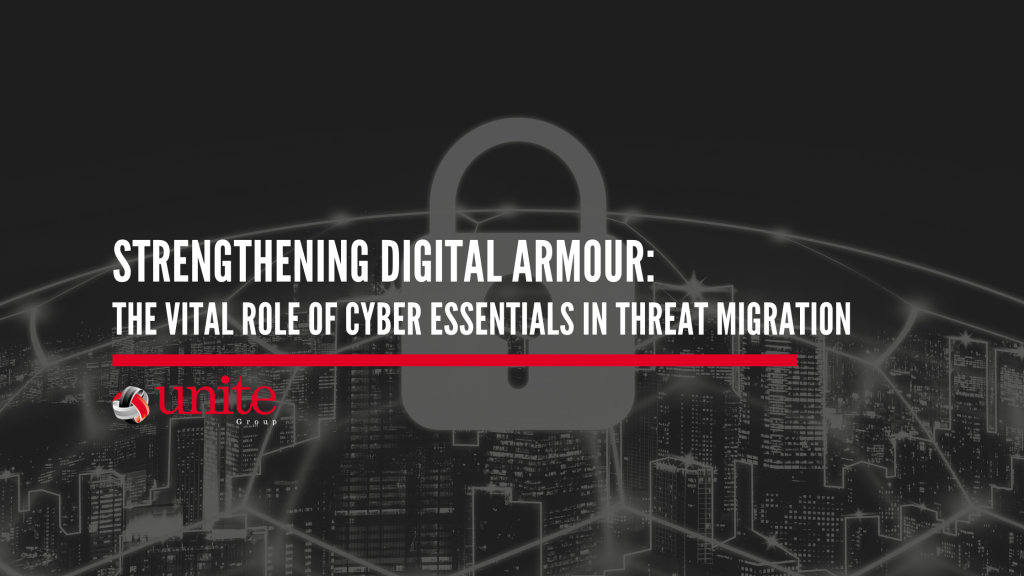
In today’s digitally driven landscape, the spectre of cyber threats looms large over businesses of all sizes. From data breaches to ransomware attacks, the consequences of a cyber incident can be devastating, both financially and reputational. Amidst this ever-present risk, implementing robust cyber security measures is no longer a luxury but a necessity. One such cornerstone of cyber resilience is Cyber Essentials – a government-backed scheme designed to protect organisations against common cyber threats. In this blog, we’ll explore the critical importance of Cyber Essentials in threat mitigation. As well as why businesses should prioritise its implementation.
Understanding Cyber Essentials:
Cyber Essentials is a cyber security certification scheme developed by the UK government to help organisations safeguard against prevalent cyber threats. It provides a framework of basic security controls that organisations can implement to mitigate the risk of common cyber attacks. By achieving Cyber Essentials certification, businesses demonstrate their commitment to cyber security best practices. As well as, enhancing their overall resilience to cyber threats.
Importance of Threat Mitigation:
In today’s hyper-connected world, cyber threats are not merely hypothetical scenarios but tangible risks that can disrupt operations, compromise sensitive data, and damage reputation. Threat mitigation, therefore, is essential for businesses to proactively identify, assess, and address potential vulnerabilities in their digital infrastructure. By implementing effective threat mitigation strategies, organisations can significantly reduce the likelihood and impact of cyber attacks.
The Role of Cyber Essentials in Threat Mitigation:
Baseline Protection:
Cyber Essentials provides a foundational framework of security controls that serve as a baseline protection against common cyber threats. From secure configuration to access control, these controls address fundamental aspects of cyber security. Laying a solid groundwork for threat mitigation.
Risk Reduction:
By implementing the security controls outlined in Cyber Essentials, organisations can mitigate known vulnerabilities and reduce the risk of cyber attacks. This proactive approach to risk management helps businesses identify and address potential security gaps before they can be exploited by threat actors.
Enhanced Resilience:
Cyber Essentials certification enhances an organisation’s resilience to cyber threats. By fostering a culture of cyber security awareness and best practices. Employees become more vigilant and adept at recognising potential threats, thereby bolstering the overall security posture of the organisation.
Regulatory Compliance:
In an increasingly regulated environment, Cyber Essentials certification demonstrates compliance with cyber security standards and regulatory requirements. For organisations operating in regulated industries such as finance, healthcare, or government, Cyber Essentials provides assurance to stakeholders that appropriate measures are in place to protect sensitive information.
Business Continuity:
Effective threat mitigation, facilitated by Cyber Essentials, is critical for ensuring business continuity in the face of cyber attacks. By minimising the impact of security incidents, organisations can avoid costly downtime, reputational damage, and financial losses, thereby safeguarding their operations and continuity.
Why Businesses Should Prioritise Cyber Essentials:
Risk Reduction:
Cyber Essentials helps businesses mitigate known vulnerabilities and reduce the risk of cyber attacks, safeguarding critical assets and sensitive information.
Regulatory Compliance:
Achieving Cyber Essentials certification demonstrates compliance with cyber security standards and regulatory requirements, instilling confidence among customers, partners, and regulators.
Enhanced Reputation:
By prioritising cyber security and achieving Cyber Essentials certification, businesses enhance their reputation as trusted custodians of data and demonstrate a commitment to protecting customer information.
Business Continuity:
Effective threat mitigation facilitated by Cyber Essentials is essential for ensuring business continuity, minimising the impact of security incidents, and safeguarding operations.
Competitive Advantage:
Cyber Essentials certification can provide a competitive advantage by differentiating businesses as proactive leaders in cybersecurity and instilling trust among stakeholders.
Conclusion: Empowering Cyber Resilience with Cyber Essentials
In an era of escalating cyber threats, the importance of effective threat mitigation cannot be overstated. Cyber Essentials serves as a foundational framework for organisations seeking to bolster their cyber security defences and mitigate the risk of cyber attacks. By prioritising Cyber Essentials implementation, businesses can enhance their resilience, demonstrate regulatory compliance, and safeguard their operations and reputation in an increasingly hostile digital landscape. In today’s cyber-threatened world, Cyber Essentials is not just a certification; it’s a vital tool for empowering cyber resilience and safeguarding the future of businesses.
To learn more about Cyber Essentials, click here to visit our page or contact us today on 0191 466 1050.
